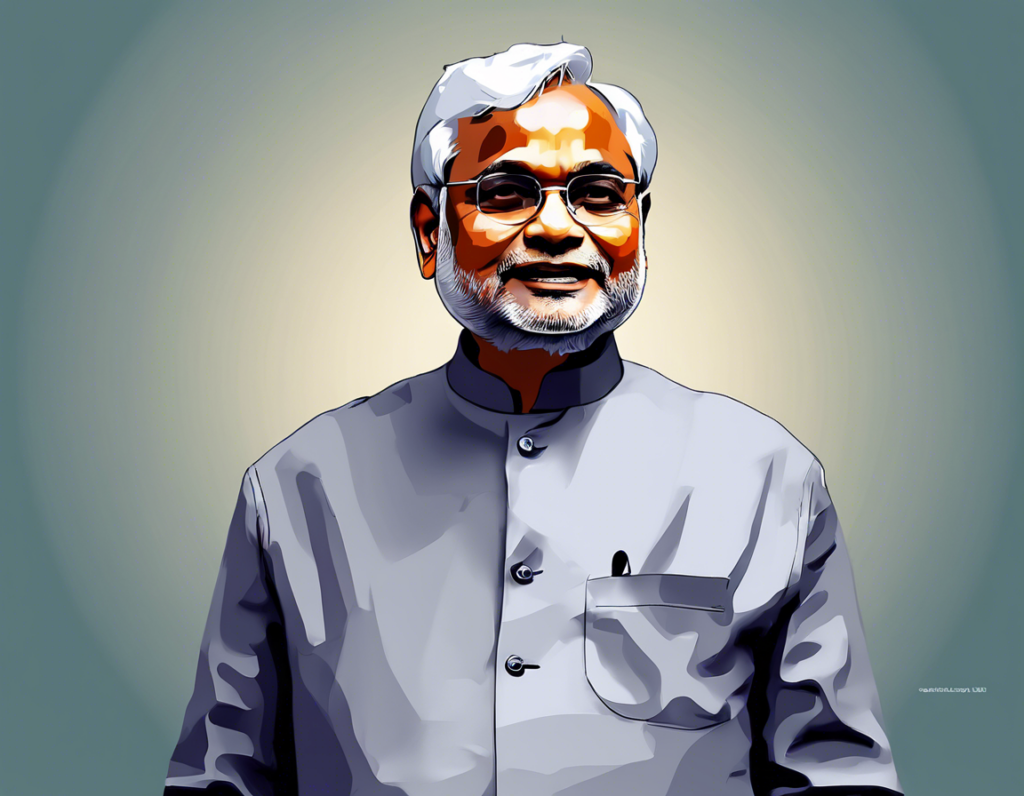
- May 18, 2024
- 2:51 am
- No Comments
Nitish Kumar is a prominent political figure in India, specifically within the state of Bihar. As the current Chief Minister of Bihar, Nitish Kumar has had a long and illustrious career in Indian politics, marked by both successes and challenges. In this article, we will take a closer look at the life and career of Nitish Kumar, his contributions to Bihar, his political ideology, and the key moments that have defined his tenure as a leader.
Early Life and Political Journey
Nitish Kumar was born on March 1, 1951, in Bakhtiarpur, Bihar. He completed his Bachelor’s Degree in Mechanical Engineering from Bihar College of Engineering, now known as NIT Patna. Nitish Kumar began his political career in the early 1970s as part of the Jayaprakash Narayan movement, which aimed to fight against corruption and the imposition of emergency in India. He joined the Samata Party in 1994 and later became the Chief Minister of Bihar in 2005.
Achievements as Chief Minister
Nitish Kumar is credited with bringing about a significant transformation in Bihar during his tenure as Chief Minister. One of his major achievements has been the improvement in law and order in the state. Crime rates have significantly reduced, and there has been a focus on maintaining peace and order, thereby attracting investments and promoting economic development in the state.
Under his leadership, Bihar has also seen improvements in infrastructure development, particularly in the areas of roads, electricity, and healthcare. The Bihar Model of Development has been lauded for its focus on grassroots development and inclusive growth.
Political Ideology and Alliances
Nitish Kumar is known for his pragmatic political ideology. He has been associated with different political parties over the years, forming alliances based on the common goal of development and governance. He was part of the National Democratic Alliance (NDA) but later broke away and formed an alliance with the Rashtriya Janata Dal (RJD) and Indian National Congress, known as the Mahagathbandhan.
In 2017, Nitish Kumar switched sides again and rejoined the NDA. His political maneuvering has earned him both praise and criticism, with some lauding his ability to adapt to changing political scenarios, while others questioning his ideological consistency.
Key Controversies and Challenges
Nitish Kumar’s tenure has not been without its share of controversies and challenges. One of the major setbacks he faced was the 2015 Bihar Assembly Elections, where his party was defeated by the RJD and the JD(U) had to sit in the opposition. However, he made a comeback in 2017 by rejoining the NDA and winning the elections.
Another controversial decision was his support for the demonetization move by the central government in 2016. While some saw it as a bold step against black money, others criticized it for its impact on the common man.
Legacy and Future Prospects
As Nitish Kumar continues to lead Bihar, his legacy remains a topic of debate among political analysts and the general public. His ability to bring about development in Bihar amidst a challenging political landscape has earned him a place in the state’s political history. However, questions remain about his future prospects, given the changing political dynamics in the country and the rise of new political parties and leaders.
Frequently Asked Questions (FAQs)
1. What are some of the key initiatives undertaken by Nitish Kumar for the development of Bihar?
– Nitish Kumar has focused on improving infrastructure, healthcare, education, and law and order in Bihar. His initiatives include the construction of roads, electrification of villages, and promotion of girl’s education through schemes like the Mukhya Mantri Kanya Utthan Yojana.
2. How has Nitish Kumar managed to maintain power in Bihar for so long?
– Nitish Kumar’s ability to navigate political alliances and prioritize development over partisan politics has helped him maintain power in Bihar. His focus on good governance and delivery of services to the people has also won him popular support.
3. What is Nitish Kumar’s stance on social issues like caste politics and reservations?
– Nitish Kumar has been known to advocate for social harmony and inclusive development. While he has supported reservations for marginalized communities, he has also emphasized the need to move beyond caste-based politics and focus on overall development.
4. How has Nitish Kumar dealt with the challenges of corruption in Bihar?
– Nitish Kumar has taken a tough stance on corruption and implemented measures to curb it. His government has set up anti-corruption bodies like the Bihar Lokayukta to investigate corruption charges and promote transparency in governance.
5. What are the criticisms against Nitish Kumar’s leadership?
– Some critics argue that Nitish Kumar’s frequent political realignments have compromised his ideological integrity. Others have raised concerns about the pace of development in Bihar and the need for more inclusive and sustainable growth strategies.
In conclusion, Nitish Kumar remains a pivotal figure in the political landscape of Bihar and India. His legacy as a leader who prioritizes development and governance will continue to shape the future of Bihar and influence the direction of Indian politics.